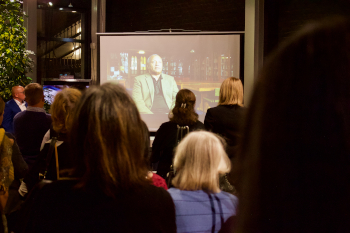
A crowd of 170 at Fluevog Shoes in Gastown celebrate the launch of Sanctuary Mental Health Ministries. Photo credit: Nathan Uttangi.
Last Thursday, 170 people crowded into Fluevog Shoes in Gastown to celebrate the launch of Sanctuary Mental Health Ministries’ new curriculum for small groups, which is designed similarly to Alpha.
Eight themes are explored from a psychological, social, and theological perspective, and each session is accompanied by a compelling film featuring the story of an individual who has journeyed through mental health challenges as a person of faith.
Our culture is currently experiencing a mental health revolution. Public figures are revealing personal mental health challenges and studies on the prevalence of mental illness are increasingly shaping civic dialogue.
In fact, recent research suggests that every Canadian will be affected by mental illness at some point in life, either through personal experience or through the diagnosis of a family member or friend.
So what does this revolution mean for the church? How should the people of God respond to a community that is finding its voice and sharing stories of pain, loss, hope and recovery?

Funky shoes and onlookers. Photo credit: Nathan Uttangi.
Sanctuary Mental Health Ministries was founded in 2012 by two women looking for answers to these very questions.
Rev. Dr. Sharon Smith and Rev. Caroline Penhale were members of the Community Mental Health Team formed by the Canadian Mental Health Association.
They conducted research focused on issues of spirituality in mental health care, and in the process discovered a general absence of mental health support within the church.
This discovery inspired them to develop a ministry for equipping the church to make a difference in the lives of individuals living with mental health challenges.
Today, Sanctuary Mental Health Ministries offers encouragement and education to local congregations that want to address the realities of mental health. Its desire is to support people of faith as they seek to thoughtfully and sensitively form communities of care for individuals impacted by mental health concerns or problems. This has led the ministry to create an exciting new resource: The Sanctuary Course.

Watching a film from The Sanctuary Course, featuring mental health and spirituality expert, John Swinton.Photo credit: Nathan Uttangi.
Designed as a curriculum for small groups, this unique eight-week course introduces participants to a range of mental health topics including mental illness, stigma, recovery, companionship and self-care.
Each session incorporates careful theological reflection on the topic, as well as discussion questions and suggested spiritual practices that encourage participants to integrate their faith and mental health journeys.
Accompanying short films provide additional insight from a variety of experts in the fields of theology and psychology, as well as highlighting the stories of believers who have experienced mental health challenges.
At the end of the course, participants will have the knowledge and language necessary to respond compassionately to those in their communities who may be suffering in their mental health.

Executive director Daniel Whitehead interviews course writer, Jane Harris.Photo credit: Nathan Uttangi.
The Sanctuary Course is available for download here.
Churches that purchase the curriculum will receive digital access to the course and its films for every small group participant.
If you want to learn more about mental health and mental illness, if you are looking for faith-based answers to difficult questions, if you want to support a family member or friend facing a mental health challenge, or if you want to discover the role the church can play in promoting mental health, explore The Sanctuary Course and join the conversation.

Much good work is being done. I only wish that the voices of those with lived experience had a bigger role in the delivery of care and support. The support being taught is important. People learn about mental health and the needs of those with lived experience. But the voices that most need to be heard are the voices of those with lived experience. Those are the ones that truly KNOW what it is. Their voices are not being heard in the way they should be.
In addition, faith-based peer support needs to be brought back. It’s the most effective form of support. ‘Peer support focuses on health and recovery, not illness or disability.’
In peer support we’re not looked on as ‘needy’ people to be cared for. The voices of people with lived experience need to be strengthened and empowered. We are not simply the victims of illness. Peer support raises self-esteem and creates confidence in those who are too often rejected by the world.
In addition, they need to hear about Jesus – He who cared for, and healed, the rejected in the days he walked the earth. He still serves and loves the rejected of today. Hearing that message – often – will bring healing to those who are suffering. They find out that God considers them of great worth, deeply loved by Him. This is the kind of spiritual support and message that the Church needs to be taught to employ.
Jesus came for such as these.